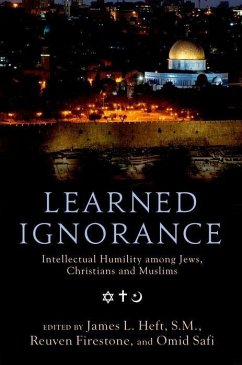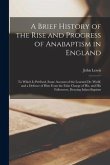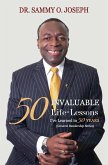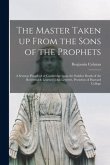Learned Ignorance
Intellectual Humility Among Jews, Christians, and Muslims
Herausgeber: Heft, James L; Safi, Omid; Firestone, Reuven
Learned Ignorance
Intellectual Humility Among Jews, Christians, and Muslims
Herausgeber: Heft, James L; Safi, Omid; Firestone, Reuven
- Broschiertes Buch
- Merkliste
- Auf die Merkliste
- Bewerten Bewerten
- Teilen
- Produkt teilen
- Produkterinnerung
- Produkterinnerung
Constructive interreligious dialogue is only a recent phenomenon. At the beginning of the twenty-first century, many branches of Christianity, not least the Catholic Church, are engaged in a world-wide constructive dialogue with Jews and also with Muslims, made all the more necessary by the terrorist attacks of September 11. The Institute for Advanced Catholic Studies brought together an international group of sixteen Jewish, Catholic and Muslim scholars to carry on an important theological exploration of the theme of ''learned ignorance.''
Andere Kunden interessierten sich auch für
![Innocence And Ignorance Innocence And Ignorance]() Innocence And Ignorance20,99 €
Innocence And Ignorance20,99 €![Guru: Removes Ignorance and Gives Wisdom; Corrects Mistakes and Provides Truth Guru: Removes Ignorance and Gives Wisdom; Corrects Mistakes and Provides Truth]() DinadevanGuru: Removes Ignorance and Gives Wisdom; Corrects Mistakes and Provides Truth15,99 €
DinadevanGuru: Removes Ignorance and Gives Wisdom; Corrects Mistakes and Provides Truth15,99 €![A Brief History of the Rise and Progress of Anabaptism in England: to Which is Prefixed, Some Account of the Learned Dr. Wiclif, and a Defence of Him A Brief History of the Rise and Progress of Anabaptism in England: to Which is Prefixed, Some Account of the Learned Dr. Wiclif, and a Defence of Him]() John LewisA Brief History of the Rise and Progress of Anabaptism in England: to Which is Prefixed, Some Account of the Learned Dr. Wiclif, and a Defence of Him18,99 €
John LewisA Brief History of the Rise and Progress of Anabaptism in England: to Which is Prefixed, Some Account of the Learned Dr. Wiclif, and a Defence of Him18,99 €![50 INVALUABLE LIFE-LESSONS I've Learned in 50 Years 50 INVALUABLE LIFE-LESSONS I've Learned in 50 Years]() Sammy O. Joseph50 INVALUABLE LIFE-LESSONS I've Learned in 50 Years19,99 €
Sammy O. Joseph50 INVALUABLE LIFE-LESSONS I've Learned in 50 Years19,99 €![Baptist Sentiments, Confirmed by the Testimony of the Most Learned Pedobaptists [microform] Baptist Sentiments, Confirmed by the Testimony of the Most Learned Pedobaptists [microform]]() Robert Alexander FyfeBaptist Sentiments, Confirmed by the Testimony of the Most Learned Pedobaptists [microform]14,99 €
Robert Alexander FyfeBaptist Sentiments, Confirmed by the Testimony of the Most Learned Pedobaptists [microform]14,99 €![The Handbook of the Energy, Aura and Chakra System - what you never learned in school The Handbook of the Energy, Aura and Chakra System - what you never learned in school]() Michael ReidThe Handbook of the Energy, Aura and Chakra System - what you never learned in school20,99 €
Michael ReidThe Handbook of the Energy, Aura and Chakra System - what you never learned in school20,99 €![The Master Taken up From the Sons of the Prophets: a Sermon Preached at Cambridge Upon the Sudden Death of the Reverend & Learned John Leverett, Presi The Master Taken up From the Sons of the Prophets: a Sermon Preached at Cambridge Upon the Sudden Death of the Reverend & Learned John Leverett, Presi]() Benjamin ColmanThe Master Taken up From the Sons of the Prophets: a Sermon Preached at Cambridge Upon the Sudden Death of the Reverend & Learned John Leverett, Presi14,99 €
Benjamin ColmanThe Master Taken up From the Sons of the Prophets: a Sermon Preached at Cambridge Upon the Sudden Death of the Reverend & Learned John Leverett, Presi14,99 €-
-
-
Constructive interreligious dialogue is only a recent phenomenon. At the beginning of the twenty-first century, many branches of Christianity, not least the Catholic Church, are engaged in a world-wide constructive dialogue with Jews and also with Muslims, made all the more necessary by the terrorist attacks of September 11. The Institute for Advanced Catholic Studies brought together an international group of sixteen Jewish, Catholic and Muslim scholars to carry on an important theological exploration of the theme of ''learned ignorance.''
Produktdetails
- Produktdetails
- Verlag: Oxford University Press, USA
- Seitenzahl: 360
- Erscheinungstermin: 1. August 2011
- Englisch
- Abmessung: 231mm x 155mm x 23mm
- Gewicht: 476g
- ISBN-13: 9780199769315
- ISBN-10: 0199769311
- Artikelnr.: 33604604
- Herstellerkennzeichnung
- Libri GmbH
- Europaallee 1
- 36244 Bad Hersfeld
- gpsr@libri.de
- Verlag: Oxford University Press, USA
- Seitenzahl: 360
- Erscheinungstermin: 1. August 2011
- Englisch
- Abmessung: 231mm x 155mm x 23mm
- Gewicht: 476g
- ISBN-13: 9780199769315
- ISBN-10: 0199769311
- Artikelnr.: 33604604
- Herstellerkennzeichnung
- Libri GmbH
- Europaallee 1
- 36244 Bad Hersfeld
- gpsr@libri.de
James L. Heft, S. M., a member of the Society of Mary (Marianists). In 2006, he became the Alton Brooks Profess of Religion and the President of the Institute for Advanced Catholic Studies at the University of Southern California. Along with three other leaders in Catholic higher education, he founded in 1996 Catholic Education: A Journal of Inquiry and Practice. He has published and edited twelve books and written over 160 articles and book chapters. Reuven Firestone is professor of medieval Judaism and Islam at Hebrew Union College in Los Angeles and founding co-director of the Center for Muslim-Jewish Engagement. His published works include Jihad: The Origin of Holy War in Islam, Children of Abraham: An Introduction to Judaism for Muslims, and Jews, Christians, Muslims in Dialogue: A Practical Handbook. Omid Safi is the Chair for the Study of Islam at the American Academy of Religion. A leading Muslim public intellectual in America, he is a professor of Religious Studies at University of North Carolina. He is the author of The Politics of Knowledge Premodern Islam and Memories of Muhammad: Why the Prophet Matters.
* 1. Preface James L. Heft
* 2. Introduction James L. Heft
* Part I: Learned Ignorance and Interreligious Dialogue
* 3. Some Requisites for Interfaith Dialogue David B. Burrell
* 4. Learned Ignorance and Faithful Interpretation of the Qur'an in
Nicholas of Cusa Pim Valkenberg
* 5. ''Seeing the Sounds'': Intellectual Humility and the Process of
Dialogue Michael Signer
* 6. Finding Common Ground: ''Mutual Knowing,'' Moderation, and the
Fostering of Religious Pluralism Asma Afsaruddin
* Part II: Must Particularity Be Exclusive?
* 7. Humble Infallibility James L. Heft
* 8. Chosenness and the Exclusivity of Truth: What does it Mean to be
''Chosen''? Reuven Firestone
* 9. The Belief in the Incarnation of God: Source or Religious Humility
or Cause of Theological Pride? Oliver-Thomas Venard
* 10. Supernatural Israel: Obstacles to Theological Humility in Jewish
Tradition Shira L. Lander
* 11. Arrogance and Humility: a Quranic Perspective Afra Jalabi
* Part III: Violence, Apologies and Conflict
* 12. After Augustine: Humility and the Search for God in Historical
Memory Elizabeth Groppe
* 13. Apology, Regret and Intellectual Humility: An Interreligious
Consideration Michael B. McGarry
* 14. Islamic Theological Perspectives on Intellectual Humility and the
Conditioning of Interfaith Dialogue Mustafa Abu-sway
* Part IV: Religious Pluralism
* 15. A Meditation on Intellectual Humility: A Fusion of Epistemic
Ignorance and Covenantal Certainty Stanislaw Krajewski
* 16. Saving Dominus Jesus Daniel Madigan
* 17. Between Tradition and Reform: The Pre-modern Sufism and the
Iranian Reform Movement Omid Safi
* 18. Epilogue: The Purpose of Interreligious Dialogue James L. Heft,
Reuven Firestone, and Omid Safi
* Index
* 2. Introduction James L. Heft
* Part I: Learned Ignorance and Interreligious Dialogue
* 3. Some Requisites for Interfaith Dialogue David B. Burrell
* 4. Learned Ignorance and Faithful Interpretation of the Qur'an in
Nicholas of Cusa Pim Valkenberg
* 5. ''Seeing the Sounds'': Intellectual Humility and the Process of
Dialogue Michael Signer
* 6. Finding Common Ground: ''Mutual Knowing,'' Moderation, and the
Fostering of Religious Pluralism Asma Afsaruddin
* Part II: Must Particularity Be Exclusive?
* 7. Humble Infallibility James L. Heft
* 8. Chosenness and the Exclusivity of Truth: What does it Mean to be
''Chosen''? Reuven Firestone
* 9. The Belief in the Incarnation of God: Source or Religious Humility
or Cause of Theological Pride? Oliver-Thomas Venard
* 10. Supernatural Israel: Obstacles to Theological Humility in Jewish
Tradition Shira L. Lander
* 11. Arrogance and Humility: a Quranic Perspective Afra Jalabi
* Part III: Violence, Apologies and Conflict
* 12. After Augustine: Humility and the Search for God in Historical
Memory Elizabeth Groppe
* 13. Apology, Regret and Intellectual Humility: An Interreligious
Consideration Michael B. McGarry
* 14. Islamic Theological Perspectives on Intellectual Humility and the
Conditioning of Interfaith Dialogue Mustafa Abu-sway
* Part IV: Religious Pluralism
* 15. A Meditation on Intellectual Humility: A Fusion of Epistemic
Ignorance and Covenantal Certainty Stanislaw Krajewski
* 16. Saving Dominus Jesus Daniel Madigan
* 17. Between Tradition and Reform: The Pre-modern Sufism and the
Iranian Reform Movement Omid Safi
* 18. Epilogue: The Purpose of Interreligious Dialogue James L. Heft,
Reuven Firestone, and Omid Safi
* Index
* 1. Preface James L. Heft
* 2. Introduction James L. Heft
* Part I: Learned Ignorance and Interreligious Dialogue
* 3. Some Requisites for Interfaith Dialogue David B. Burrell
* 4. Learned Ignorance and Faithful Interpretation of the Qur'an in
Nicholas of Cusa Pim Valkenberg
* 5. ''Seeing the Sounds'': Intellectual Humility and the Process of
Dialogue Michael Signer
* 6. Finding Common Ground: ''Mutual Knowing,'' Moderation, and the
Fostering of Religious Pluralism Asma Afsaruddin
* Part II: Must Particularity Be Exclusive?
* 7. Humble Infallibility James L. Heft
* 8. Chosenness and the Exclusivity of Truth: What does it Mean to be
''Chosen''? Reuven Firestone
* 9. The Belief in the Incarnation of God: Source or Religious Humility
or Cause of Theological Pride? Oliver-Thomas Venard
* 10. Supernatural Israel: Obstacles to Theological Humility in Jewish
Tradition Shira L. Lander
* 11. Arrogance and Humility: a Quranic Perspective Afra Jalabi
* Part III: Violence, Apologies and Conflict
* 12. After Augustine: Humility and the Search for God in Historical
Memory Elizabeth Groppe
* 13. Apology, Regret and Intellectual Humility: An Interreligious
Consideration Michael B. McGarry
* 14. Islamic Theological Perspectives on Intellectual Humility and the
Conditioning of Interfaith Dialogue Mustafa Abu-sway
* Part IV: Religious Pluralism
* 15. A Meditation on Intellectual Humility: A Fusion of Epistemic
Ignorance and Covenantal Certainty Stanislaw Krajewski
* 16. Saving Dominus Jesus Daniel Madigan
* 17. Between Tradition and Reform: The Pre-modern Sufism and the
Iranian Reform Movement Omid Safi
* 18. Epilogue: The Purpose of Interreligious Dialogue James L. Heft,
Reuven Firestone, and Omid Safi
* Index
* 2. Introduction James L. Heft
* Part I: Learned Ignorance and Interreligious Dialogue
* 3. Some Requisites for Interfaith Dialogue David B. Burrell
* 4. Learned Ignorance and Faithful Interpretation of the Qur'an in
Nicholas of Cusa Pim Valkenberg
* 5. ''Seeing the Sounds'': Intellectual Humility and the Process of
Dialogue Michael Signer
* 6. Finding Common Ground: ''Mutual Knowing,'' Moderation, and the
Fostering of Religious Pluralism Asma Afsaruddin
* Part II: Must Particularity Be Exclusive?
* 7. Humble Infallibility James L. Heft
* 8. Chosenness and the Exclusivity of Truth: What does it Mean to be
''Chosen''? Reuven Firestone
* 9. The Belief in the Incarnation of God: Source or Religious Humility
or Cause of Theological Pride? Oliver-Thomas Venard
* 10. Supernatural Israel: Obstacles to Theological Humility in Jewish
Tradition Shira L. Lander
* 11. Arrogance and Humility: a Quranic Perspective Afra Jalabi
* Part III: Violence, Apologies and Conflict
* 12. After Augustine: Humility and the Search for God in Historical
Memory Elizabeth Groppe
* 13. Apology, Regret and Intellectual Humility: An Interreligious
Consideration Michael B. McGarry
* 14. Islamic Theological Perspectives on Intellectual Humility and the
Conditioning of Interfaith Dialogue Mustafa Abu-sway
* Part IV: Religious Pluralism
* 15. A Meditation on Intellectual Humility: A Fusion of Epistemic
Ignorance and Covenantal Certainty Stanislaw Krajewski
* 16. Saving Dominus Jesus Daniel Madigan
* 17. Between Tradition and Reform: The Pre-modern Sufism and the
Iranian Reform Movement Omid Safi
* 18. Epilogue: The Purpose of Interreligious Dialogue James L. Heft,
Reuven Firestone, and Omid Safi
* Index







![Baptist Sentiments, Confirmed by the Testimony of the Most Learned Pedobaptists [microform] Baptist Sentiments, Confirmed by the Testimony of the Most Learned Pedobaptists [microform]](https://bilder.buecher.de/produkte/66/66138/66138430m.jpg)

